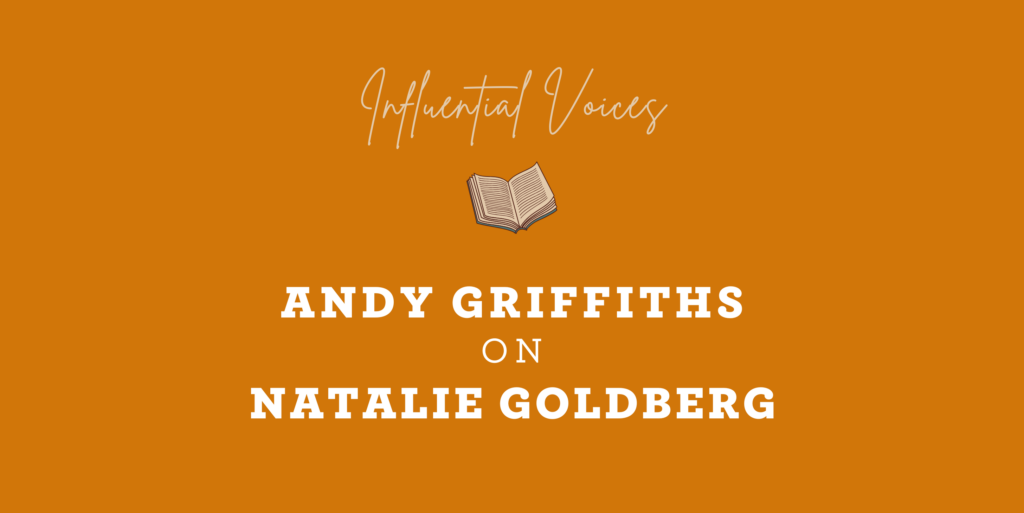In 1989 I attended a poetry workshop in Ballarat in which the presenter (whose name I’ve either forgotten or intentionally blanked out) did not hold back in her assessment of my poem (‘I don’t think this poem is saying anything’). She was harsh, sure, but fair. The really valuable part of that workshop, however, is that she presented us with some sample pages of American poet and writing teacher Natalie Goldberg’s classic book, Writing Down the Bones.
Prior to discovering this book, I was mainly concentrating my efforts on trying to discipline myself to craft short stories and poems for literary journals and competitions. I wrote a lot, but it was always with a view to creating a specific piece with the intention of impressing an editor or a judge. I rarely wrote freely or spontaneously, but Natalie Goldberg changed all that for me and completely transformed my approach to writing. In retrospect, I can see that the book helped me to lay strong and sure foundations for the 30 books I’ve created since, which is why—out of the countless writers I’ve read and been inspired by—Goldberg is the writer who’s had the biggest effect on my writing.
Her main contention is that writers need to practise writing in the same way that regular meditation practice is essential to practitioners of Zen. The ‘timed writing practice’ she describes in her book consists of setting a countdown timer to, say 3 minutes, and then writing down a memory or free association triggered by a random topic (eg ‘Tree’ / ‘Blue’ / ‘Tooth’) into an inexpensive notebook as fast you can without stopping until the time is reached. There are four rules to the practice.
Writing practice Rule One: keep your hand moving.
It’s better to be writing something, anything, than to sit there just chewing your pen thinking about what you could possibly write. The process of writing begets writing. Even if you just start out writing about the fact that you’re having trouble thinking of something to write about on the chosen topic you’ll find that something appears before too long … but only if you keep your hand moving!
Writing practice Rule Two: Don’t think.
Most of us wrestle with an internal editor/censor when we try to write. We go to write something that might be a little edgy/revealing/too honest for comfort and the editor pulls us back before we’ve even got the words on the page, eg ‘What will people think if they know that you did that—or even have those sort of thoughts?’ The idea of this rule—in combination with the first—is to write so quickly that your internal editor can’t keep up with you. Our instinct is often to stop and shy away when we approach something raw and/or disturbing in our writing—writing fast helps overcome this potential inhibition. Don’t worry, you can always edit—or destroy—it later, but at least you’ll have some vital raw honest material to work with.
Writing practice Rule Three: Be specific.
Where possible use names of people, plants, animals, cars, foods, drinks, places, objects. Include specific colours, smells, thoughts, tactile experiences—no detail is too small and the smallest of details can help to paint a much bigger picture. These details can be layered in if you choose to rewrite/rework the piece of writing, but it’s good to grab as many as you can in the first instance.
Writing practice Rule four: Lose control.
You might start out writing a memory about a specific subject that turns into a general conjecture that leads you to recounting a dream you had last night which reminds you of something else completely—perhaps the thing you really wanted to write about but were avoiding. Write it all down. It’s not your job to try to work out what it all means or what’s worth keeping—if anything—until afterwards.
I began by devoting 10 minutes a day to this practice. What started as a catalogue of memories, however, soon developed into a free and fascinating exploration of the entire contents of my mind—the good, the bad, the ugly and, well, the just plain nonsensical. I soon found myself doing it for an hour or more every day for the next five years. I still have suitcases full of my writing practice journals. I go back to them occasionally but the real value was in simply doing them for their own sake. Writing practice helps you to build your ability to translate thoughts into words so that when you do hit on ideas you can get them down, quickly, spontaneously and fearlessly. Writing practice is also an invaluable tool for self-exploration and will guide you towards what you really want—and need—to write.
About the Writer
Andy Griffiths is the author of the much-loved Treehouse series which has been published in over 35 countries and won 10 Australian Book Industry Awards—including Book of the Year in 2015.

